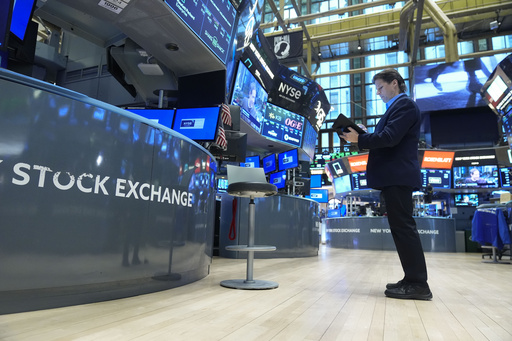Wall Street displayed a mixed performance in premarket trading on Thursday, with significant U.S. airlines facing challenges while health insurance stocks enjoyed a surge.
Futures for the S&P 500 dipped by 0.1% ahead of the market opening, while Dow Jones Industrial Average futures saw a slight increase of 0.1%.
Major U.S. airlines saw their stock values decline after American Airlines announced strong profits but warned of expected losses in the upcoming first quarter. The carrier’s stock fell by 7.5% prior to the opening. United Airlines, which reported solid results late Wednesday, saw a 2.2% drop in share prices. JetBlue and Southwest Airlines also experienced declines of 2.5% and 1.6%, respectively, as both companies prepare to announce their financial results next week.
In contrast, Elevance Health lifted the insurance sector by surpassing Wall Street’s sales and profit expectations, in addition to raising its dividend. Its share price increased by 5.5% before trading began, followed by Cigna with a 3.8% rise and UnitedHealth Group, which saw a 1.6% gain. CVS Health added a modest 1.3% increase.
In the gaming industry, Electronic Arts struggled, experiencing a drop of over 17% after investors reacted negatively to its preliminary results. The company attributed the disappointing performance primarily to an unexpected decline in bookings within its global football division.
On a positive note, GE Aerospace advanced by 5.5% after it exceeded Wall Street’s expectations regarding both sales and profits.
Market participants are also on the lookout for the latest figures on jobless benefit applications from the government, which are anticipated to fall within the consistently healthy range observed in recent years.
Across Europe, mid-day trading saw Germany’s DAX index rise by 0.3%, while the CAC 40 in Paris increased by 0.4%. Meanwhile, Britain’s FTSE 100 advanced approximately 0.2%.
In efforts to stimulate its underperforming stock markets, China has implemented additional measures to boost confidence and encourage rising prices. Beijing officials announced that pension and mutual funds will be required to increase their stock purchases to ensure market value growth. Additionally, publicly listed companies are being urged to increase their stock buybacks and dividends to enhance shareholder returns, as reported by Wu Qing, head of the China Securities Regulatory Commission.
This news resulted in a 0.5% increase in Shanghai’s share prices, closing at 3,230.16. However, Hong Kong’s Hang Seng index did not maintain its gains and fell 0.4% to 19,700.56.
Ipek Ozkardeskaya of Swissquote Bank remarked that initial relief over Donald Trump’s lack of immediate tariff announcements on China did not last long, emphasizing the president’s intent to impose a new 10% tariff on Chinese imports. The subdued buying interest suggests a continuation of a bearish sentiment surrounding Chinese equities, she noted.
In Tokyo, the Nikkei 225 index saw an 0.8% increase, reaching 39,958.87.
Fuji Media Holdings faced a significant loss with a 7.8% drop in its share price following the retirement announcement of Masahiro Nakai, a prominent Japanese TV host, who is stepping down amidst sexual assault allegations that have rocked Japan’s entertainment sector, leading to substantial advertising revenue loss.
In other parts of Asia, Australia’s S&P/ASX 200 index fell by 0.6%, closing at 8,378.70, while Seoul’s Kospi index decreased by 1.2% to 2,515.49. India’s Sensex observed a modest 0.3% rise, while Thailand’s SET lost 0.7%.
In the cryptocurrency arena, optimism surrounding Trump potentially creating a more favorable environment for the industry has contributed to surging prices, with Bitcoin trading just below $102,000, down from a record peak of over $109,000 earlier in the week according to CoinDesk.
In energy markets, the U.S. benchmark crude oil saw a minor increase of 17 cents, reaching $75.61 per barrel, while Brent crude rose by 20 cents to hit $79.20 per barrel.
The U.S. dollar slightly weakened, standing at 156.38 Japanese yen, decreasing from 156.43 yen. Additionally, the euro fell to $1.0404 compared to $1.0411 in previous trading.



